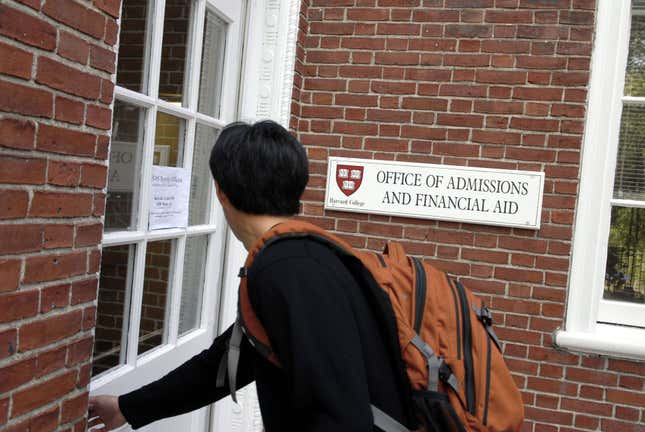
A U.S. appeals court has rejected a case challenging Harvard’s affirmative action policy.
According to CNN, the case was brought forth by a group of Asian American students who felt the university’s policy disproportionately benefited Black and Hispanic students. Judge Sandra Lynch wrote the ruling for the appellate panel and found the university’s “limited use of race” in its admissions practices didn’t violate the precedent set by the Supreme Court.
“Harvard has an ongoing obligation to engage in constant deliberation and continued reflection regarding its admissions policies,” Lynch wrote. “Harvard has shown that its holistic consideration of race is not impermissibly extensive.”
Edward Blum, president of Students for Fair Admissions (SFFA), filed the lawsuit in November 2014 and has already stated his intention to appeal the ruling. It’s apparently Blum’s lifework to make it harder for Black and brown students to get into college.
He was the one behind Abigail Fisher’s case against the University of Texas in 2016. Fischer, for those unaware, was a teenager who thought her whiteness was the reason behind her not getting into the school and not, you know, the fact her grades were lower than the majority of folks who were admitted.
Blum lost that case in the Supreme Court, which is where this case is all but certain to go.
Things are far different than they were four years ago. Affirmative action cases have barely been upheld by the court in the past, and the Republican party’s 6-3 supermajority on the court means that long-standing protections for Black and Hispanic students could be at risk should the court take up the appeal.
From CNN:
The Harvard case has been closely watched from the start because of the prevalence of affirmative action practices nationwide. It took on new relevance this summer as the country focused on systemic racism, ignited by the May 25 police killing of George Floyd in Minneapolis.
One of the main points of contention was Harvard’s use of a “personal” score, in addition to academic and extracurricular ratings, that SFFA challengers say allowed admissions officials to enhance the prospects of Black and Hispanic applicants and disadvantage Asian Americans.
The appeals court on Thursday rejected the claim, as had US District Court Judge Allison Burroughs after a three-week trial.
The SFFA challengers had argued that the flexible “personal” rating has led to the racial stereotyping of Asian Americans. During the trial, SFFA contended Asian Americans were typecast as one-dimensional or merely “book smart.”
The appeals court found the claims of stereotyping to be unfounded, with the personal rating being based on more factors than simply race.
“Harvard’s interest in diversity is not an interest in simple ethnic diversity, in which a specified percentage of the student body is in effect guaranteed to be members of selected ethnic groups, but a far broader array of qualifications and characteristics of which racial or ethnic origin is but a single though important element,” Lynch wrote.
The SFFA also claimed in the case that the school imposes “a racial penalty” on Asian Americans, a claim that Harvard’s lawyers roundly rejected. For the class of 2024, Harvard said its demographics break down to 24.6 percent Asian American students, 13.9 percent Black students, 11.8 Hispanic students, and Indigenous students make up 2 percent. The remaining 47.7 percent is white.
Maybe I’m just bad at math, but being the second most populous demographic at the university doesn’t exactly seem like a penalty to me. Just saying.
Should the Supreme Court decide to take up the appeal, the case most likely wouldn’t be heard until later next year.

